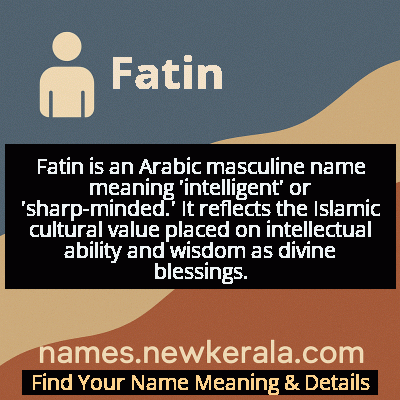Fatin Name Meaning & Details
Origin, Popularity, Numerology Analysis & Name Meaning of Fatin
Discover the origin, meaning, and cultural significance of the name FATIN. Delve into its historical roots and explore the lasting impact it has had on communities and traditions.
Name
Fatin
Gender
Male
Origin
Muslim
Lucky Number
5
Meaning of the Name - Fatin
Fatin is an Arabic masculine name meaning 'intelligent' or 'sharp-minded.' It reflects the Islamic cultural value placed on intellectual ability and wisdom as divine blessings.
Fatin - Complete Numerology Analysis
Your Numerology Number
Based on Pythagorean Numerology System
Ruling Planet
Mercury
Positive Nature
Adventurous, dynamic, curious, and social.
Negative Traits
Restless, impatient, inconsistent, prone to indulgence.
Lucky Colours
Green, white.
Lucky Days
Wednesday.
Lucky Stones
Emerald.
Harmony Numbers
1, 3, 9.
Best Suited Professions
Sales, marketing, travel, entertainment.
What People Like About You
Versatility, charisma, adventurous spirit.
Famous People Named Fatin
Fatin Gökmen
Astronomer and Scientist
First director of Turkish State Meteorological Service and founder of Kandilli Observatory
Fatin Rüştü Zorlu
Diplomat and Politician
Former Turkish Foreign Minister and key figure in Turkish foreign policy during the 1950s
Fatin Abdel Wahab
Film Director
Renowned Egyptian film director known for classic Arabic cinema productions
Fatin Shidqia
Singer
Winner of X Factor Indonesia and successful recording artist
Name Variations & International Equivalents
Click on blue names to explore their detailed meanings. Gray names with will be available soon.
Cultural & Historical Significance
The name has been particularly prominent in Ottoman and modern Turkish history, as well as in Arab intellectual circles. It represents the Islamic golden age tradition of valuing scholarship and scientific inquiry. Throughout history, many bearers of this name have been scholars, scientists, and intellectuals, continuing the legacy of Islamic scholarship that flourished during periods like the Abbasid Caliphate. The name serves as a reminder of Islam's rich intellectual heritage and the religion's encouragement of seeking knowledge throughout one's life.
Extended Personality Analysis
Individuals named Fatin are typically characterized by their sharp intellect, analytical thinking, and quick comprehension. They possess natural curiosity and a thirst for knowledge that drives them to continuously learn and explore new ideas. Fatins often demonstrate excellent problem-solving abilities and can grasp complex concepts with ease. Their mental agility makes them adaptable in various situations, and they tend to excel in academic and professional environments that challenge their cognitive abilities.
Beyond their intellectual capabilities, Fatins are often perceived as thoughtful and perceptive individuals who carefully consider their actions and words. They may exhibit leadership qualities rooted in their ability to analyze situations comprehensively and make informed decisions. While sometimes reserved in social settings, they form deep connections with those who appreciate intellectual discourse. Their intelligence is typically complemented by a strong sense of responsibility and ethical awareness, making them reliable and trustworthy individuals in both personal and professional relationships.
Modern Usage & Popularity
In contemporary times, the name Fatin maintains steady popularity in Muslim-majority countries, particularly in the Middle East, Southeast Asia, and among Muslim communities worldwide. While not among the most common names, it enjoys consistent usage among parents who value its intellectual connotations and cultural heritage. The name has seen some resurgence in popularity as modern Muslim parents seek names that combine traditional roots with meaningful attributes relevant to contemporary success. In countries like Malaysia, Indonesia, Turkey, and Arab nations, Fatin remains a respected choice that bridges classical Islamic tradition with modern educational and professional aspirations.
Symbolic & Spiritual Meanings
Symbolically, Fatin represents the light of intelligence that illuminates darkness and confusion. It embodies the metaphorical concept of mental clarity cutting through ignorance, much like a sharp blade. The name carries connotations of enlightenment, wisdom, and the transformative power of knowledge. In Islamic symbolism, it connects to the concept of 'aql (intellect) as a divine gift that enables humans to understand God's creation and fulfill their purpose. The name also symbolizes the bridge between tradition and progress, representing how intellectual pursuit can honor cultural heritage while driving innovation and development in modern contexts.

